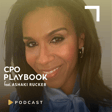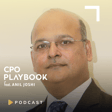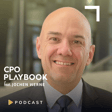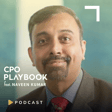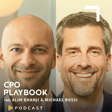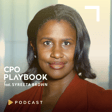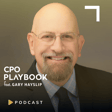Introduction to CPO Playbook Podcast
00:00:01
Speaker
I'm Felicia Shakiba, and this is CPO Playbook, where we solve a business challenge in every episode.
00:00:12
Speaker
Corn Ferry states that the CEO's most important asset is a high-performing executive team. When focusing on organizational enhancement, our attention typically gravitates towards refining our products, bolstering customer satisfaction, and streamlining internal processes as key avenues for performance optimization.
Enhancing Executive Team Effectiveness
00:00:33
Speaker
Yet, amidst these priorities lies a profound opportunity often overlooked.
00:00:38
Speaker
nurturing the effectiveness and performance of the CEO's most prized asset, the executive team. By channeling our efforts into empowering this pivotal group, we unlock a cascade of benefits that address myriad challenges concurrently.
00:00:54
Speaker
It's a strategic move that not only fortifies leadership, but also catalyzes improvements across various facets of the organization.
Introduction to Duncan O'Rourke and Accor
00:01:02
Speaker
It is my privilege today to introduce a distinguished guest who will offer valuable insights on crafting successful leadership teams. Joining us is Duncan O'Rourke.
00:01:12
Speaker
the CEO overseeing operations in the Middle East, Africa, Turkey, and Asia-Pacific regions for Accor's premium min-scale and economy sectors. Calling in from Dubai. Duncan, it's a pleasure to see you again. Thanks for being here. Thanks very much, Felicia. Lovely to be able to speak to you.
00:01:34
Speaker
Duncan, could you provide a brief overview of your position at Accor and outline the organizational structure of Accor at a high level?
00:01:44
Speaker
Ok, Akua is one of the world's biggest hospitality leaders. We have probably around 260,000 people, or heart as we call them, operating over 5,200 hotels. We are really concerned with excelling in customer service and providing our guests with the best possible stay that they can have.
00:02:07
Speaker
I have the privilege of leading the Middle East, Africa, Asia-Pacific region. That's around 40 countries, having probably two-thirds of the world's population, where we operate an incredible portfolio of over 1,000 hotels. So in this region, in my region, we have around 89 or 90,000 team members working
00:02:29
Speaker
for our impressive brands, such as the Pullman, Novotel, Ebies, Mervin Peak, Swiss hotels, many, many brands there. Aku actually has 46 brands. And my executive team, Felicity, comprises of an agile focus team of just seven experts who lead this operations, talent and culture, and these commercial objectives that we have for the region.
Assessing Executive Team Effectiveness
00:02:55
Speaker
That sounds like an incredible feat to take on that much responsibility. How do you assess and measure the effectiveness of your executive team?
00:03:08
Speaker
Very good question. It's actually a simple answer. We are very results focused, making sure we deliver the best results for our stakeholders, our owners, the communities, our employees. And so it's really a results driven objective, but of course, embracing all our values that are so important to our core.
00:03:31
Speaker
results focused that I've heard of that competency a lot. Can you share what does that mean to you and your team?
00:03:41
Speaker
We have targets that pertain to what we're trying to achieve. Targets are not only financial, targets in terms of growth, growing the portfolio. Our targets also include talent and culture, embracing new talent into teams in hotels, making sure that we have the right people in the right place at the right time,
00:04:02
Speaker
making sure that the high talent doesn't leave us and that we'll be able to recruit new talent into the organization. So there's many specific targets in there. Again, not all results driven, but always extremely important for what we're trying to achieve.
Values and Competencies of Executive Teams
00:04:21
Speaker
When you are thinking about assembling or bringing together your executive team, what are those specific qualities or competencies that you prioritize? And I know you alluded to it earlier around managing or creating great teams, but what are those specific qualities and competencies that you would factor in?
00:04:47
Speaker
People's values play a very important part in my decision-making process. It's really important that the values that my team have are aligned with mine, with the groups and what we try and achieve. I also really look for subject matter experts who are the best at what they do and so there's a level of specialization in terms of that and I make sure that I really have the best out there when I'm assembling these teams and when I'm creating these teams there.
00:05:15
Speaker
The leaders, the people on my team should inspire confidence and believe in their own teams. And that's also extremely important for me that they believe in their own teams. I also value people who have the ability to really lead from above a good strategic mindset, be able to see the big picture. I actually call it and liken it to looking from a balcony down rather than on the dance floor. And so that's also important for me.
00:05:42
Speaker
But also when I create these teams, I ask myself, do they recognise the improvement opportunities when they come in? Do they see what I see, that there's a huge improvement opportunity? Do they feel accountable for not just their success or their own business area, but the entire company's success?
00:06:03
Speaker
And do they really have the energy, and that's super important for me specifically in the region I'm in, do they have the energy to preserve if it's going to get tough? And it always gets tough, and it will always get tough, and so do they have that energy? And as I mentioned right when I started there, are they really good role models?
00:06:25
Speaker
And it's a challenging thing because when you start to do this composition of the team, I like to keep a team small, but not too small. It's important that the structure and the organization doesn't really dictate the team's membership.
00:06:41
Speaker
I've worked before with the small team, fewer than six, and that actually was detrimental. It created poor decision-making because there was a lack of diversity, there was slower decision-making because of a lack of bad width as well. And so the team's effectiveness started to diminish a little bit.
00:07:00
Speaker
there and the opposite as well. I've worked in teams and been part of teams where there were more 10 or 12 people and that's also really not the optional way because it undermines ownership of group decisions just merely a lot of time because there isn't time to be heard. So getting that sweet spot exactly right is very, very important in what you're trying to do and what you're trying to achieve.
Communication Strategies for Diverse Teams
00:07:24
Speaker
I heard so many incredible competencies there. So I heard values-based, ownership, resiliency, role modeling, diversity. These are the focus areas, would you say? Correct. Absolutely correct. In leading a global team, how do you ensure that there is open communication and alignment with the company culture across multiple regions, functions, and even subcultures?
00:07:55
Speaker
I have a very, very clear framework where we regularly communicate. I encourage an open and very transparent culture of communication. My executive team, so I have actually eight, my executive and I speak weekly. It's a short call. It's 14 minutes every week, but it's really
00:08:13
Speaker
in terms of alignment and airing out any issues or latest news that we need to tackle there. I don't have a team sitting in one office here in Dubai with me. Due to the geographic theatre of where I'm playing, I prefer to have it spread out in different offices around the region. So we have team members in Singapore, team members in Sydney, team members in Bangkok here in Dubai as well. So that's a challenge in itself.
00:08:39
Speaker
but this communication or the short communication keeps everybody aligned and it's one thing to get the right team composition but only when the people start working together does the real character of that team begin to reveal itself and once that happens then you are able to achieve really substantial
00:09:01
Speaker
And so what I do is no decision of consequence is taken alone. It is done with my team. Every decision of consequence will be taken with my team. And so to be able to do that, you have to have high interaction, a lot of trust, open communication, and then that team willing to embrace conflict and challenges. That's important.
00:09:25
Speaker
as well. I also let the team work in an environment where they are energized because they feel they can take those risks. They can innovate and they can learn from outside matters as well. So that's probably how I would sum up that topic in question.
00:09:41
Speaker
I love that you talked about the character of the team. I've never heard it in that phrase before, but I feel like it's so clear because it's not just about the individuals that come to the table. It's about how they work
00:09:58
Speaker
Together and so I think the character of the team I think is was really important piece to that decisions of consequence I liked that you talked about having those one-on-ones because I think a lot of leaders or even executives at your level at the CEO level are
00:10:17
Speaker
They don't always take that one-on-one too seriously, right? They're very busy. There's a lot of fires they need to put out. How do you ensure that one-on-one stays consistent and how important is it to you and your team to have it?
00:10:33
Speaker
It's very important because you have the team dynamics and you have those group meetings as well, but the one-on-ones are imperative in my opinion because it gives each of your team members an ability to go more granular, not just in terms of operations or work,
00:10:50
Speaker
but also on a personal level of challenges that they're facing within the team. And so we spend a lot of time talking about the team that they have, the challenges that they are facing. And that's very, very important to be able to do that. So I think that when we meet together, that balcony view is very, very important. And the big picture as we drive forward talking about
00:11:11
Speaker
strategy and goals and where we're trying to meet. But that one-on-one is, in my opinion, just as important where you give. And that's why I said you can't really have that with 13, 14 or 15 people. You just don't have the time to do it. And so having the right number of reports to you gives you that opportunity to spend time with that one-on-one. Just speaking about the teams and the individual one-on-ones, when you talk about their teams,
00:11:37
Speaker
And so, like I said, I have eight people reporting to me. And I actually insisted that those eight executives report to me. They only allow to have eight people report to them. I've pushed that down. And three times a year, what I do is I bring everybody together. So, I bring all the eight that report to me, plus the eight reports of each of theirs. And so, we meet
00:12:02
Speaker
three times a year, and that's a very powerful meeting as well because you have all those executives or the N-2s coming in, eight from each of them, and that also brings a tremendous amount of teamwork, alignment, and focus.
The Role of Diversity in Decision-Making
00:12:18
Speaker
These are skip-level meetings that you're talking about? Correct, correct.
00:12:24
Speaker
I know that you talked a little bit about diversity and how important that was. Tell me, what does having that diverse team mean to you? What is that difference that it makes at your level?
00:12:37
Speaker
I think it's super important. Many years ago, I read that all male teams make better decisions 58% of the time, and gender diverse teams do it 75% of the time. And that really struck me, and I never forgot that. It's so important and I cause values. It's one of our cause major values is to have an encouraged diversity through the organization. We have a target of
00:13:03
Speaker
49% coming up to 50% of all the teams in our core with diversity. So that's really important as well in doing that. Human resources or talent and cultures, we talk about it plays an integral part there as well. In fact, my talent and culture, who's on my executive sits on every single meeting, including approvals on hotels that we're going to sign or financial plans, because there's always
00:13:30
Speaker
talent behind this financial decision or this operational decision. And so we encourage all of that. That's so refreshing to hear. I think that there are many teams or executives as they grow, right? I mean, you have a tremendous amount of talent that you're working with. But as teams grow, a lot of times where I've seen executives
00:13:58
Speaker
actually exclude their people, leader, you know, from these decision making conversations or even from board meetings, which quite frankly boggles me because I'm not sure how they make decisions without that talent perspective. But from what I'm hearing from you is that it's imperative to have that person in the room because they're looking at talent from all angles of the business impact.
00:14:26
Speaker
That's absolutely correct. I encourage talent and culture. Our head of talent and culture for the region sits in every single strategic decision. Any growth that we do in any opportunities, any acquisition is around every single decision. Just exactly what you said, just because the repercussion of that decision means that you'll be hiring, talking, growing with talent. And so the more they're there, the better right at the beginning and part of that process.
00:14:56
Speaker
In thinking about those strategic decision-making processes within your executive team, how do you involve the various departments? We talked a little bit about your talent and culture executive, and then how does
00:15:12
Speaker
How do you bring the team together to make decisions? Do you parse the team in accordance with something that might be specifically going on with their functions? Do you have a quarterly or weekly meeting with the team? How does that decision-making process play out?
00:15:29
Speaker
I've always said that people learn when they're empowered and provided with the opportunity. So I really invest in my team. I spend a lot of time with them and I encourage them to flourish. We're talking about decision making process. We discuss mistakes as a source of feedback and improving as much as we discuss success as well.
00:15:48
Speaker
I think it's very important to provide teams with resources, with tools to support their interests. And really what I do a lot is I don't manage. There's no one on my team that I manage, but what I really do is I stretch their skills and their gifts. I stretch them as much as possible to really make them better leaders and take on new projects.
00:16:09
Speaker
What I also have always done this in my career is when I've moved up, I've always pulled up. And what I mean by that, as I've been promoted, I've always then pulled people up with me and then promoted them as well. And I think that's very, very important to do that. So that trust is really important in my leadership style. I make goals very, very clear. I make the goal line very clear.
00:16:33
Speaker
And then generally in good plain English get out of the way because the team is dynamic and they will get across the goal line themselves. Something I've always struggled with is understanding how you address the challenge of exceptionally talented executives who may struggle with teamwork.
00:16:54
Speaker
It's a good question. Like I said, I don't hire anybody in the team that needs to be managed. I do stretch them as well. I empower them tremendously. I encourage them to take risks and I provide them with as much resources as I can to be successful.
Empowering Teams and Aligning Goals
00:17:10
Speaker
There's always in any team, there's always healthy competition between the members and that's why you bring everybody together regularly. Even if it's a half an hour 40-minute phone call once a week,
00:17:20
Speaker
just a quick two-page PowerPoint. That's it, no more than two-page PowerPoint. Just highlighting what's going on, what are the challenges, what happened, and how are we tackling these challenges. And there's a total alignment in there. My team, I'm very proud of that. The team that I assembled here is so aligned in helping each other. And when one is struggling, the others are picking them up and driving them forward and providing resources. And so it's really moving in the right direction there.
00:17:50
Speaker
It takes time. It doesn't happen overnight. It's not in one month that happens. You form that team and when you form that team there's a little bit of conflict in the beginning and a little bit of elbow pushing and that's par for the course as well because people are finding
00:18:05
Speaker
their place and each member is so different. Each talent on that team's character and goals and objectives and vision is so different. So you encourage that. You let that first a little bit, not too much, and you make sure it doesn't get out of hand, but that's part of the course. And then after that, the team starts to norm and you start to really then get that good momentum going and the goals and alignment. And then later you start to see that probably it took me with this particular one here. It took me about.
00:18:36
Speaker
year, I would say, until you really start to see a high-performing, really dedicated, efficient team. It's a lovely thing to see because when you reach that level, you can then, in my position, you can then add more. You can add more goals, you can add more projects, you can stretch even more, you can grow even more.
00:18:57
Speaker
And when i say it's not just talking about my team of that high performing it's the team below them that n and two team below them that is also at a high performing team and it's a lovely thing to see. For executives tuning in where should they begin to enhance their teams effectiveness or performance.
00:19:19
Speaker
I think the most important thing is to really have a clear view on what you want to achieve for your business at that particular time. And so be very, very clear on where you want to go. And then really spend time and a lot of time getting to know your team's strengths and weaknesses.
00:19:37
Speaker
that takes a lot of work and a lot of time and then obviously you're going to highlight and optimize the strengths and make sure that the places where they need improvement are not exposed that much and so that's a dynamic in itself and of course you have to work very very closely with talent and culture to really develop programs tailored into creating high performance teams and so
00:19:59
Speaker
The first person I hire always is talent and culture. It's the very first position I hire in forming a team because once you align there, that trust between you and the head of talent and culture in being able to create this team and drive this team, it's so, so important. I think as well, don't be afraid to use expertise from outside your organization in terms of team building, in terms of motivation, in terms of
00:20:30
Speaker
It's always good to do that and to expose your team continuously to outside practices, even if it's not in your industry, just in terms of team and what teams are doing. I really spend a lot of time doing that as well. And then again, monitoring and having very transparent and open conversations with your team.
00:20:51
Speaker
at six months or yearly reviews. Be very transparent in what has happened, what your expectations are, where you are going. Don't be afraid to make changes to the team. What you thought was a great team right at the beginning. Maybe you need to make one change and tweak in terms of creating the best performance for that structure.
00:21:11
Speaker
Don't be afraid to do that as well. It's never good for the talent on the team or the organization if there's a misalignment or a mix. And don't be afraid to do that. But really invest in the team, get to know the team, and have a very, very clear target of where you want to go. Short-term, medium-term, but most importantly, long-term. And make sure there's a total alignment on that as well.
00:21:37
Speaker
I think alignment is so critical. It's so important. I always say that a shake in the leader is a shake in the organization. I'm sure you know why, but from an employee's perspective, and I've spent a lot of time diving into insights and surveys of employee engagement and so forth, leadership is such a huge factor.
00:21:58
Speaker
engagement all the way down to entry-level position and regardless of however many employees you have because leadership is always in the spotlight and it is the one major consistency that everyone sees in the entire organization and so if you are taking the most common denominator and looking at the behavior and the messaging and the communication and
00:22:22
Speaker
it really like i said shakes the entire organization and so i think that alignment across the functions especially at the top and what you were talking about.
Avoiding Silos Through Executive Alignment
00:22:34
Speaker
I see very clearly is so critical because very often cross functionally teams go silo.
00:22:41
Speaker
And there is a huge opportunity, I think, for a lot of executives to bring those functions together. And if they do it at the top, it's much easier to do it throughout the organization. But I also feel like some of those silos functionally are due to how executive leaders at the top are working independently versus together. Would that be fair to say?
00:23:08
Speaker
No, absolutely. And when you look at that, when you're forming these teams, just thinking back as you were asking the question in passing, you have highly, highly intellectual, highly talented individuals on a team, but maybe not the best fit for the structure and the organization.
00:23:25
Speaker
And because they're so talented, they're so well-read in intellectual in terms of what they can do, you make a lot of compromises and keep them on the team and give them what they want and do what they want. But in the end, that's not good. It's detrimental. It's detrimental to the team. And in the long term, it doesn't really pay out.
00:23:45
Speaker
When you have individuals these highly talented but more lonely you have to really encourage them and embrace them and work with them to really be part of the team and that takes a lot of work and a lot of time and so you have to have that talent on your team but you have to spend more time with them.
00:24:00
Speaker
then to make sure that there is that total alignment i don't just spend time with my executive team when i'm in the offices i walk around the office is continuously i thank people on all different levels in the structure in the organization,
00:24:16
Speaker
for what they're doing. It's not uncommon for me just to walk in. I walk past the meeting room and see meetings going on, just to walk in and sit down and listen to what's been discussed because you learn a lot. And in this structure where I am, it encourages people at all levels to speak their mind and to speak about their concerns and what they feel. And my team embraces that as well. And you get a tremendous amount of information as well.
00:24:41
Speaker
different information when you spend time with everyone and so it's difficult because you have so much on your plate and you traveling but my recommendation do once in a while spend time with the rest of the organization as much as you can because there's a tremendous amount of talent there, there's a tremendous amount of wealth there
00:25:00
Speaker
as well and so important you get to know future succession planning as well and that's important because you understand you talk you feel and you learn and you can start to put your eyes around how the succession planning looks in your structure and that's one of the key responsibilities obviously so I totally agree with what you said there and embrace that tremendously.
00:25:23
Speaker
Well, Duncan, you've definitely provided an incredible amount of insight. Thank you so much for being here and sharing your story and your journey. And it's been a pleasure. Thank you so much for having me. I really enjoyed speaking with you. It's really nice. And obviously I have listened to your other podcasts and that, and so it's inspiration and I'm very proud to be able to contribute to this.
00:25:51
Speaker
That's Duncan O'Rourke, CEO of the Middle East, Africa, Turkey, and Asia Pacific at Accor.



